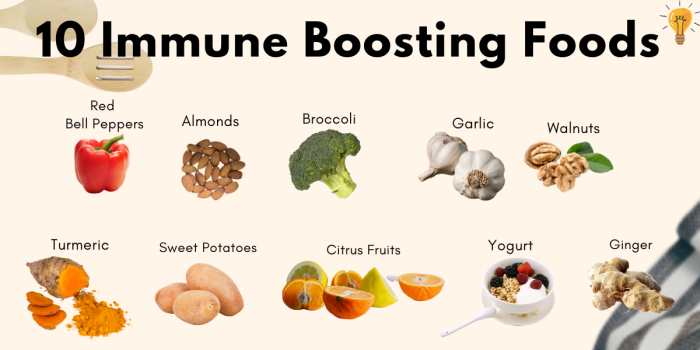
Our immune system is our body’s natural defense against infections and diseases. A strong immune system is crucial for overall health and well-being. While genetics play a role, our lifestyle choices, particularly our diet, significantly impact our immune function. Eating a balanced diet rich in immune-boosting foods can help strengthen our defenses and protect us from illness.
This article will explore the relationship between nutrition and immunity, highlighting key nutrients that support immune function and showcasing a variety of foods that can boost our natural defenses. We’ll also delve into lifestyle factors that contribute to a robust immune system and provide practical tips for incorporating these strategies into daily life.
Foods to Limit or Avoid

While focusing on nutrient-rich foods is essential for a robust immune system, it’s equally crucial to be mindful of certain foods that can hinder its function. Consuming excessive amounts of processed foods, sugary drinks, and alcohol can contribute to inflammation, oxidative stress, and other factors that weaken the immune system’s ability to fight off infections and diseases.
Processed Foods
Processed foods often contain high amounts of unhealthy fats, added sugars, and sodium, all of which can contribute to chronic inflammation. Inflammation is a natural immune response, but chronic inflammation can weaken the immune system, making it more susceptible to infections. Processed foods are also often low in essential nutrients, further compromising the body’s ability to function optimally.
- Fast food: Burgers, fries, pizza, and other fast food options are often high in saturated fat, trans fat, and sodium. They also tend to be low in fiber and other essential nutrients.
- Packaged snacks: Many packaged snacks, such as chips, cookies, and candy bars, are high in added sugars and unhealthy fats. These foods provide little nutritional value and can contribute to weight gain and other health problems.
- Processed meats: Hot dogs, sausages, and bacon are high in sodium, saturated fat, and preservatives. These foods can also be linked to an increased risk of certain types of cancer.
Sugary Drinks
Sugary drinks, such as soda, juice, and sports drinks, are loaded with added sugars. These drinks provide empty calories and can contribute to weight gain, type 2 diabetes, and other health problems. Excess sugar consumption can also suppress the immune system’s function, making it more vulnerable to infections.
- Soda: Soda is a major source of added sugar and is linked to several health problems, including obesity, type 2 diabetes, and heart disease. It also contributes to tooth decay.
- Fruit juice: While fruit juice contains some vitamins and minerals, it’s often high in sugar and lacks the fiber found in whole fruits. Drinking excessive amounts of fruit juice can have similar negative effects as drinking soda.
- Sports drinks: Sports drinks are designed for athletes who need to replenish electrolytes lost during intense exercise. However, most people don’t need to consume sports drinks regularly. They are high in sugar and can contribute to weight gain and other health problems.
Excessive Alcohol Consumption
Excessive alcohol consumption can significantly impair the immune system’s ability to function properly. Alcohol can suppress the production of white blood cells, which are essential for fighting off infections. It can also damage the gut lining, making it easier for harmful bacteria to enter the bloodstream.
- Reduced immune cell production: Alcohol consumption can decrease the production of white blood cells, which are crucial for fighting off infections. This weakens the immune system’s ability to respond to pathogens.
- Gut health disruption: Alcohol can damage the gut lining, allowing harmful bacteria to enter the bloodstream. This can lead to inflammation and other health problems.
- Increased susceptibility to infections: Studies have shown that excessive alcohol consumption can increase the risk of developing infections, including pneumonia, tuberculosis, and HIV/AIDS.
Lifestyle Factors for Immune Health

Lifestyle choices play a crucial role in bolstering your immune system, working in synergy with a balanced diet. These factors influence your body’s ability to fight off infections and maintain overall well-being.
Adequate Sleep
Getting enough sleep is essential for immune function. While you sleep, your body produces proteins called cytokines that help regulate inflammation and fight infection. Sleep deprivation can suppress your immune system, making you more susceptible to illness.
Aim for 7-9 hours of quality sleep each night.
- Establish a regular sleep schedule, going to bed and waking up around the same time each day, even on weekends.
- Create a relaxing bedtime routine that signals to your body it’s time to wind down. This could include taking a warm bath, reading a book, or listening to calming music.
- Make sure your bedroom is dark, quiet, and cool for optimal sleep conditions.
Stress Management
Chronic stress can weaken your immune system by increasing the production of cortisol, a hormone that can suppress immune cells. Stress management techniques can help to reduce cortisol levels and improve your immune response.
- Practice mindfulness meditation, yoga, or deep breathing exercises to help calm your mind and body.
- Engage in activities you enjoy, such as spending time in nature, listening to music, or pursuing hobbies.
- Seek support from friends, family, or a therapist to talk about your stressors and find healthy coping mechanisms.
Regular Exercise
Regular physical activity can boost your immune system by increasing blood circulation, improving lymphatic drainage, and reducing inflammation. Exercise also helps to regulate stress hormones, which can benefit your immune response.
Aim for at least 150 minutes of moderate-intensity aerobic activity or 75 minutes of vigorous-intensity aerobic activity per week.
- Find activities you enjoy, such as walking, running, swimming, cycling, or dancing.
- Start gradually and increase the intensity and duration of your workouts over time.
- Listen to your body and rest when you need to.
Maintaining a Healthy Weight
Obesity can suppress immune function, making you more susceptible to infections and chronic diseases. Maintaining a healthy weight can help to improve your immune response and reduce your risk of these conditions.
Talk to your doctor about a healthy weight range for you.
- Eat a balanced diet that is rich in fruits, vegetables, whole grains, and lean protein.
- Limit your intake of processed foods, sugary drinks, and unhealthy fats.
- Engage in regular physical activity to help you maintain a healthy weight.
Food and Related Products
In addition to dietary changes, incorporating specific food products and supplements can further enhance your immune system’s ability to fight off infections and maintain overall health. Let’s explore some of the key categories and their potential benefits.
Food and Related Products for Immune Health
These products offer a variety of nutrients and compounds that contribute to immune function.
| Product Category | Examples | Benefits | Potential Applications |
|---|---|---|---|
| Immune-Boosting Supplements | Vitamin C, Zinc, Elderberry, Vitamin D |
|
|
| Functional Foods | Yogurt with probiotics, Fortified cereals, Kefir |
|
|
| Superfoods | Berries, Leafy greens, Turmeric, Garlic, Ginger |
|
|
Product Creation
The realm of immune-boosting products is constantly evolving, presenting exciting opportunities for innovative food and supplement creations. By harnessing the power of nature’s bounty and incorporating cutting-edge technology, we can develop products that cater to the growing demand for natural solutions to enhance immune health.
Novel Ingredient Combinations
Blending unique ingredients with proven immune-enhancing properties can create powerful synergies.
- Elderberry and Zinc: A potent combination known for its antiviral and immune-boosting properties. Elderberry is rich in antioxidants and has shown effectiveness against respiratory infections, while zinc is essential for immune cell function. A delicious elderberry syrup with added zinc could be a popular choice for children and adults alike.
- Mushroom Extracts and Probiotics: Mushrooms like reishi, chaga, and lion’s mane have long been revered for their immune-modulating properties. Combining these extracts with probiotics, which support gut health and immune function, can create a potent blend for overall immune support. A daily mushroom and probiotic supplement could be marketed as a comprehensive approach to gut and immune health.
- Turmeric and Ginger: These potent anti-inflammatory spices are renowned for their immune-boosting properties. A turmeric and ginger tea or a smoothie mix with added antioxidants could provide a flavorful and convenient way to support immune function.
Unique Flavor Profiles
Appealing to diverse palates is key to product success.
- Infused Waters and Beverages: Infuse water with natural flavors like citrus, berries, or herbs, along with immune-boosting ingredients like elderberry, ginger, or turmeric. These refreshing beverages can provide a convenient and flavorful way to support immune health.
- Superfood Snacks: Combine nutrient-rich ingredients like chia seeds, goji berries, and spirulina with immune-boosting spices like cinnamon and turmeric. These snacks can be packaged as granola bars, energy bites, or trail mixes.
- Functional Foods: Incorporate immune-boosting ingredients into everyday foods like yogurt, granola, or even bread. For example, a yogurt with added probiotics and elderberry extract could provide a delicious and nutritious way to boost immunity.
Innovative Delivery Methods
- Micronized Powders: Micronizing ingredients can increase their bioavailability and absorption, leading to greater effectiveness. Micronized powders of immune-boosting ingredients like elderberry, zinc, or vitamin C can be added to smoothies, juices, or even sprinkled on food.
- Targeted Delivery Systems: Utilizing targeted delivery systems, such as liposomes or nano-particles, can ensure that immune-boosting ingredients reach their intended destinations in the body, maximizing their impact.
- Personalized Nutrition: Offering personalized recommendations based on individual needs and dietary preferences can enhance product effectiveness and satisfaction. Using genetic testing or personalized dietary assessments, individuals can receive tailored recommendations for immune-boosting foods and supplements.
Bed and Breakfast Inns
Bed and breakfast inns offer a unique and often more personalized travel experience compared to traditional hotels. They can be especially appealing to those seeking a relaxing and healthy getaway, as many prioritize guest well-being.
Bed and Breakfast Inns for Immune Health
Some bed and breakfast inns go above and beyond to cater to guests’ health needs, offering a range of immune-boosting amenities and experiences. These inns often prioritize fresh, local ingredients in their breakfasts, provide access to fresh produce, and create a relaxing atmosphere conducive to stress reduction. Here are some examples of bed and breakfast inns that prioritize guest health and well-being:
| Inn Name | Location | Special Features | Immune-Boosting Offerings |
|---|---|---|---|
| The Inn at Gracewood | Asheville, North Carolina | Organic gardens, locally sourced ingredients, yoga studio, meditation room | Daily breakfast with fresh fruits, vegetables, and whole grains; access to organic produce from the inn’s garden |
| The Farmhouse Inn | Healdsburg, California | Award-winning restaurant, scenic vineyard views, spa services | Breakfast menu featuring seasonal fruits, homemade granola, and locally sourced eggs; access to fresh produce from the inn’s garden |
| The Inn at Little Washington | Washington, Virginia | World-renowned fine dining, luxurious accommodations, peaceful countryside setting | Breakfast menu featuring fresh fruits, homemade jams, and locally sourced dairy products |
| The White Barn Inn | Kenyon, Maine | Farm-to-table dining, outdoor activities, stunning ocean views | Breakfast menu featuring fresh fruits, homemade breads, and locally sourced eggs |
Cooking and Culinary
When it comes to boosting your immune system, the food you eat plays a crucial role. But it’s not just about what you eat, but also how you cook it. Certain culinary techniques can help preserve nutrients and enhance the immune-boosting properties of your food. This section will explore some of these techniques and provide examples of recipes that incorporate them.
Steaming
Steaming is a gentle cooking method that involves cooking food in a basket over boiling water. This method helps to preserve nutrients, especially water-soluble vitamins like vitamin C, which are easily lost in other cooking methods.
Steaming is particularly beneficial for delicate vegetables like broccoli, asparagus, and spinach, as it helps to retain their vibrant color and crisp texture. Additionally, steaming can enhance the flavor of certain foods, such as fish, by allowing the natural juices to concentrate.
Roasting
Roasting is a dry-heat cooking method that involves cooking food in an oven at a high temperature. Roasting can enhance the flavor and texture of many foods, including vegetables, meats, and poultry. This method is particularly effective for bringing out the natural sweetness of vegetables like carrots, sweet potatoes, and Brussels sprouts.
While roasting can be a healthy cooking method, it’s important to use healthy fats like olive oil or avocado oil and avoid overcooking, which can lead to nutrient loss. Roasting vegetables with herbs and spices can further enhance their flavor and provide additional antioxidants.
Blanching
Blanching is a quick cooking method that involves plunging food into boiling water for a short period of time, followed by an immediate ice bath. This method helps to preserve the color, texture, and nutrients of vegetables. Blanching is often used as a preparation step before freezing or preserving vegetables.
Blanching can help to soften vegetables and make them easier to digest. It also helps to remove any bitter compounds that may be present in certain vegetables, such as broccoli. Blanched vegetables can be used in salads, soups, or as a side dish.
Minimal Processing
Minimal processing refers to cooking methods that involve minimal manipulation of food. This includes techniques like grilling, sautéing, and stir-frying. Minimal processing helps to preserve nutrients and flavor, as it reduces the amount of time food is exposed to heat.
When using minimal processing techniques, it’s important to use high-quality ingredients and avoid overcooking. Grilling fish or chicken with a drizzle of olive oil and lemon juice can be a healthy and flavorful way to prepare these foods. Sautéing vegetables in a little bit of olive oil and garlic can create a delicious and nutritious side dish.
Examples of Immune-Boosting Recipes
Here are some examples of immune-boosting recipes that incorporate the culinary techniques discussed above:
- Steamed Salmon with Lemon and Dill: This recipe combines the benefits of steaming with the flavor of fresh herbs and citrus. The salmon is cooked gently over boiling water, preserving its delicate texture and nutrients. The lemon and dill add a refreshing and tangy flavor, while the salmon provides a good source of omega-3 fatty acids, which are known to support immune function.
- Roasted Root Vegetables with Rosemary and Thyme: This recipe showcases the benefits of roasting for bringing out the natural sweetness of root vegetables. The rosemary and thyme add a savory and aromatic flavor, while the roasting process helps to concentrate the nutrients in the vegetables. Root vegetables are a good source of vitamins, minerals, and antioxidants, all of which are important for immune health.
- Blanched Green Beans with Garlic and Lemon: This recipe combines the benefits of blanching with the flavor of garlic and lemon. The green beans are cooked quickly in boiling water, preserving their vibrant color and crisp texture. The garlic and lemon add a savory and tangy flavor, while the green beans provide a good source of vitamin C, which is an important antioxidant.
- Grilled Chicken with Mango Salsa: This recipe incorporates the benefits of grilling with the freshness of mango salsa. The chicken is cooked over high heat, creating a flavorful and crispy exterior. The mango salsa adds a sweet and tangy flavor, while the chicken provides a good source of protein, which is essential for immune function. The mango is a good source of vitamin C and antioxidants.
By incorporating immune-boosting foods into our diet, staying hydrated, getting enough sleep, managing stress, exercising regularly, and maintaining a healthy weight, we can significantly strengthen our immune system and enhance our overall health. Remember, a healthy lifestyle is a holistic approach, and each element plays a vital role in protecting us from illness and promoting well-being.
Question & Answer Hub
What are some easy ways to incorporate immune-boosting foods into my daily diet?
Start by adding a variety of colorful fruits and vegetables to your meals and snacks. Choose lean protein sources like fish, chicken, beans, and lentils. Include whole grains like brown rice, quinoa, and oats in your diet. Experiment with incorporating superfoods like berries, leafy greens, and turmeric into your meals.
How much water should I drink daily for optimal immune function?
The general recommendation for daily water intake is 8 glasses. However, individual needs may vary based on factors like activity level, climate, and overall health. Listen to your body and drink water throughout the day to stay hydrated.
Are there any specific supplements that can help boost immunity?
While supplements can be helpful, it’s important to consult with a healthcare professional before taking any supplements, especially if you have underlying health conditions or are taking medications. Some commonly recommended supplements for immune support include vitamin C, zinc, and elderberry.






